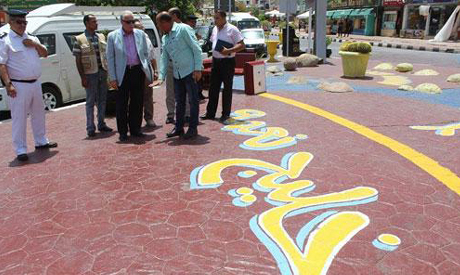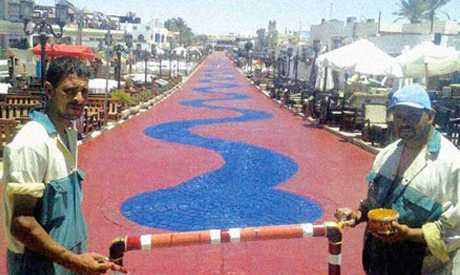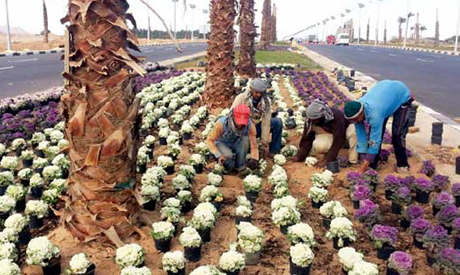Once again the resort city of Sharm El-Sheikh in Egypt's Sinai is at the centre of Egyptian politics. In 2011, ousted autocrat Hosni Mubarak took refuge there as millions took to the streets calling on him to step down. Now, Sharm El-Sheikh will host the Egyptian Economic Development Conference on which authorities are pinning high hopes of attracting at least $10 billion in foreign investment to prop up the country’s battered economy.
Sharm El-Sheikh, lying on the southern tip of the Sinai Peninsula, is a world famous tourist destination, drawing in a significant portion of Egypt’s annual tourism revenues, estimated at a little over 11 percent of GDP.
The sprawling resort city used to be a village overlooking the strategic Strait of Tiran, leading into the Gulf of Aqaba, which borders Egyptian, Jordanian, Saudi Arabian and Israeli territory. The closure of this Strait by former Egyptian President Gamal Abdel Nasser in 1967 was taken as justification by Israel to launch the Six Day War against Egypt, which it won, occupying Sinai.
This was the second time Sharm El-Sheikh was occupied by Israel: the first in the 1956 Tripartite Aggression against Egypt. The city’s strategic value is elevated by its also being close to the entrance the Gulf of Suez, the latter ending with the Suez Canal connecting the Arabian Sea and beyond to the Mediterranean.
After the Camp David Accords between Egypt and Israel, and the subsequent withdrawal of Israel’s army from Sinai at the beginning of the 1980s, Sharm El-Sheikh’s development was rapid.
In less than 10 years, Sharm El-Sheikh was unrecognisable to campers who used to pitch tents in Naema Bay, to enjoy the natural remoteness of the location. Naema’s shoreline is now dominated by a stretch of 5-star hotels and resorts — testament to Egypt’s increasing reliance on tourism as one of its main sources of revenue after the 1970s.

Officials supervise beautification of Naema Bay (Photo: Al-Ahram)
For this reason, the political upheaval that took Egypt by storm after the 2011 revolution that ousted Mubarak hit it hard. Following the removal of Islamist president Mohamed Morsi in summer 2013, which was followed by deadly clashes and political instability, tourism revenues plummeted to almost 20 percent of its value in the earlier year.
As investment fled, the new president elected in May 2014, Abdel-Fattah El-Sisi, Egypt’s former army chief who oversaw Morsi’s ouster following mass protests against him, sought to restore confidence in the Egyptian economy. The economic conference became one of his main focal points.
Sharm El-Sheikh is a veteran host to world leaders. The city, which is home to Mubarak’s infamous lavish villa, propped up on a cliff overlooking the Red Sea and subject to an ongoing corruption case against Mubarak and his family, was also home to many international conferences.
Former leaders who visited the city to attend conferences include ex-US President Bill Clinton, ex-UN Secretary General Kofi Annan, recently deceased Saudi King Abdullah II, Palestinian leaders Yasser Arafat and Mahmoud Abbas, Israeli premiers Shimon Peres and Ariel Sharon, and many others.
Indeed, Sharm El-Sheikh had become a hub for peace talks between the Israelis and Palestinians. A formal end to the four-year second Palestinian Intifada came at a summit in the city in 2005. This earned it the title, “city of peace.”
While famous for summits on regional and international issues, local woes were also discussed there.
In 2002, a donors conference Egypt held there saw pledges of $10 billion from foreign countries to shore up the same economic indicators whose deterioration is driving this week’s investment conference: large public deficit, contracting foreign currency reserves, and a slump in foreign investment, albeit from different causes.
Egypt’s government and private sector will jointly present 60 projects to investors, hoping to attract up to $15 billion in investment. Egypt’s growth rate was slashed to less than two percent in 2011 compared to an average of five percent in 2010. An average of seven percent growth over the next four years is the country’s current target, according to officials.
Sharm, as it is commonly called, bares little resemblance to other Egyptian cities relying heavily on tourism. For some, the city lacks an "Egyptian" character, sporting clean, wide and well-paved streets, with blocks of lush, well-trimmed flora surrounding its resorts.

Painters pose at Naama Bay's main promenade (Photo: Al-Ahram)
In Naema Bay, tens of cafes, restaurants, bazaars and bars, dive centres and tourism offices fill unblemished, winding promenades leading to the beach, rented out by hotels boasting the prime Naema seaview location.
Sharm residents have said its luster owes much it being “Mubarak’s town,” where the ousted president reportedly spent much of his time, especially towards the end of his era.
Despite its glamorous reputation, special arrangements to further beautify and polish the city are being undertaken ahead of the economic conference this month.
Sidewalks, pedestrian streets and street signs have been repainted; art works have been set up, and flower beds replanted, according to statements by Sharm’s governor, Khaled Foda.

Gardeners plant new flowers at one of Sharm El-Sheikh main roads (Photo: Al-Ahram)
Egypt is keen on making a good impression as officials and business representatives fly to Sharm this week. Included in the conference programme are presentations by Egyptian officials on legal and fiscal reform Egypt is carrying out to create a more "investor friendly" atmosphere.
In a more direct move to project a positive image, Foda gathered the drivers that will transfer conference attendees to their hotels at a stadium and distributed new suits to all of them at a quarter of their price.
“Buy flowers before the conference, meet them with flowers … this is for Egypt and you are representing it,” he told them.
Officials are hoping the conference will bump up occupancy levels in Sharm's hotels, which have been hovering around 50 percent, a lower-than-usual level due to recent devaluations of the Russian ruble.
The conference will take place from 13 to 15 March.
Short link: